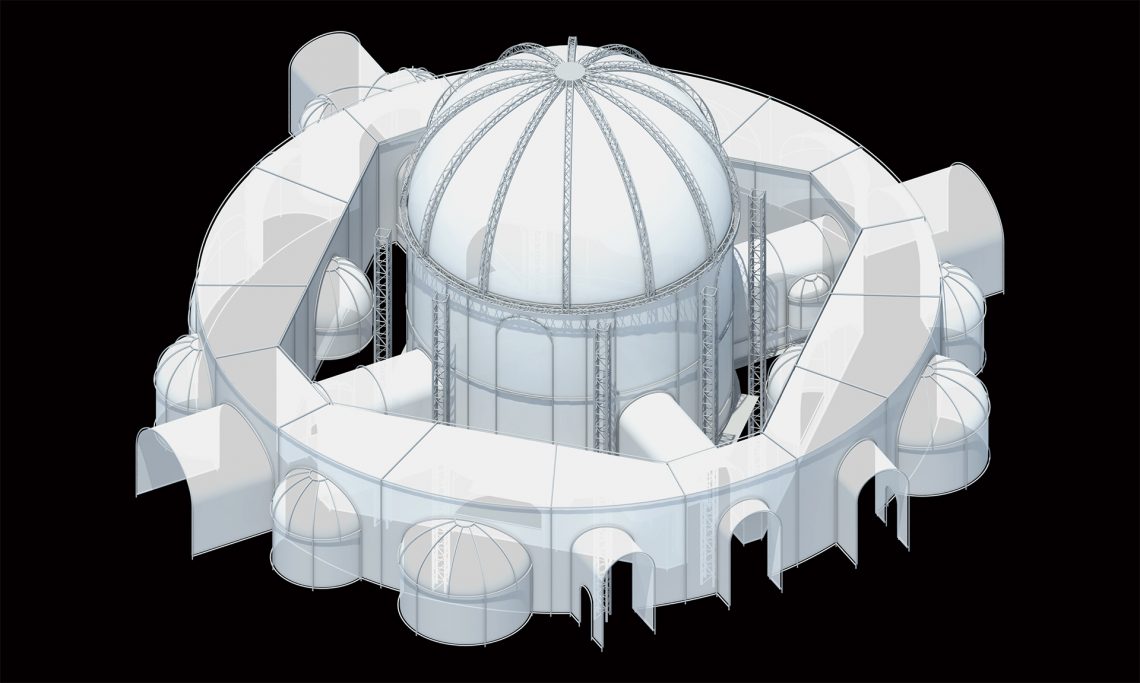on view through 14 august 2016.
fashion lures architecture and design to the metropolitan museum of art’s costume institute spring 2016 exhibition, manus x machina: fashion in an age of technology. the exhibition explores how designers are reconciling the handmade and the machine-made in the creation of haute couture and avant-garde ready-to-wear. manus x machina features over 170 garments, diverse in their designers, techniques and details.
the credits
manus x machina is organized by andrew bolton, curator in charge of the metropolitan museum of art’s costume institute. shohei shigematsu, director of oma new york, led the design of the exhibition in collaboration with the design department (amo) of oma new york.
the architecture
from the architect> the exhibition is presented in the robert lehman wing, a double-height, octagonal addition on the museum’s central axis constructed in 1975. in order to preserve access to the permanent galleries, the exhibition space is located in the lehman wing’s central atrium and corridors. the space posed a number of unique environmental challenges for the costume institute’s show: excessive daylighting unconducive to textile exhibition, split levels, a corridor condition lacking dedicated display walls and an eclectic material palette.
a white, translucent volume was inserted into the existing brick and stone corridors of the lehman wing, softening its hard geometries. echoing the sectional relationship of a central clerestory and perimeter naves, the resulting ghost cathedral resonates with the classical language of the adjacent medieval art gallery. a raised platform built across the double height atrium provides continuous circulation and a 2,300 square foot central gallery– an unprecedented intervention in the lehman wing. upon arrival, this domed clerestory orients visitor’s with a 2014 chanel wedding dress by karl lagerfeld that embodies the exhibition’s theme. details of the 20-foot train’s baroque pattern are projected on the dome’s black out scrim, recalling the sistine chapel. four chapel-style pochés provide an area to focus on case studies.
Image may be NSFW.
Clik here to view.
exhibition designer shohei shigematsu commented, “the diverse range of garments required a neutral, integrated environment to focus on the pairings of manual and mechanical processes. an armature of scaffolding wrapped with a translucent fabric introduces a unique temporality within a historic institution.”
as a high-performance theatrical scrim, the perforated membrane material of the ghost cathedral offers the tensile flexibility required for the dome geometries as well as varying degrees of transparency. when lit from the front, the scrim appears opaque enough to function as a projection backdrop for garment details. lit from behind, the scrim appears transparent, exposing a sense of the lehman wing’s existing material palette and language. the unexpected spatial depth of the scrim allows for visual connections to the wedding dress from all quadrants of the lehman wing, while also revealing silhouettes of the temporary scaffolding framework housed within. in the lower level, scrim enfilades provide a permeable divider for each technique. as an integrated system for lighting, signage and projection, the scrim seamlessly serves multiple curation needs that would otherwise rely on overpowering media screens.
photography courtesy of omatechnical information
manus x machina: fashion in an age of technology
location: new york city usa
year: 2016
status: completed (commissioned 2015 / completion may 2016)
program: 18,300 sf exhibition
scrim surface area: 23,000 sf
architect: oma
lead architect: shohei shigematsu / oma nyc
team: scott abrahams, wesley ho, nicholas solakian, sergio zapata, daniel rauchwerger, lawrence siu, darby foreman, matthew haseltine, christine noblejas
engineering: arup
lighting: dot dash
media: 3 legged dog
membrane: newmat
scaffolding: ubs
masonry: cw keller
photography: albert večerka
the fashion
andrew bolton’s brilliant new exhibition at the metropolitan museum of art’s costume institute – the costume institute began as the museum of costume art in 1937, merged with the met in 1946, and reopened its space as the anna wintour costume centre in may 2014 – explores the relationship between the handmade and the mechanized in fashion. bolton’s vision pays homage to craftsmanship, innovation and the role designers play in the creative process.
the show’s galleries are divided into tenets of design outlined in diderot’s 1751 encyclopedia: embroidery, featherwork, artificial flowers, lacework, leatherwork, pleating, tailoring, and dressmaking. another interesting counterpoint emerges: haute couture versus prêt-à-porter.
alber elbaz succinctly explained why “manus x machina” is so important at a lecture prior to the opening: “it was almost an exhibition that was done for designers and with designers’ work. it was about workmanship, about know-how, about time, and the one thing that impressed me the most was that it was almost silent. . . . please go and see it.”
this is an exhibition for true fashion lovers.







